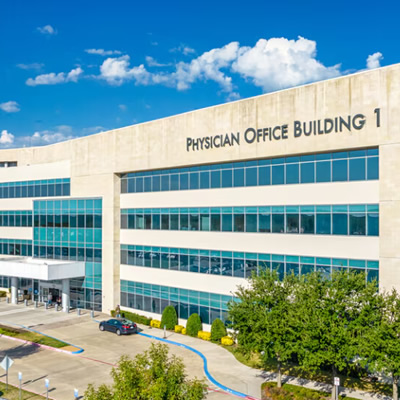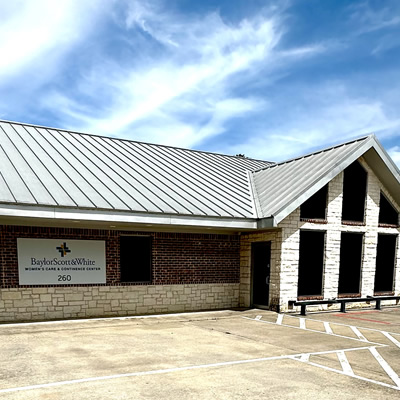Board-certified urogynecology care serving North Texas.
Timothy L. Sandmann, MD, FACOG, FACS, is a board-certified Urogynecologist in McKinney and Sherman and has provided care in North Texas since 1991. Having helped many female patients, Dr. Sandmann and his staff understand the emotional sensitivity and concerns related to pelvic disorders. He brings a personalized approach to each patient by carefully evaluating their problem and formulating a plan that best suits them. Dr. Sandmann treats a variety of pelvic disorders, such as bladder prolapse, uterine prolapse and incontinence. He treats female patients 30 years old and up, between child-bearing age and menopause, who are experiencing incontinence or other gynecological problems.

Baylor Scott & White Women's Care & Continence Center - McKinney
5236 W University Dr Ste 2700, McKinney, TX, 75071- Monday: 8:30 am - 5:00 pm
- Tuesday: 8:30 am - 5:00 pm
- Wednesday: 8:30 am - 5:00 pm
- Thursday: 8:30 am - 5:00 pm
- Friday: 8:30 am - 5:00 pm

Baylor Scott & White Women's Care & Continence Center - Sherman
260 E Evergreen St , Sherman, TX, 75090- Monday: 8:30 am - 5:00 pm
- Tuesday: 8:30 am - 5:00 pm
- Wednesday: 8:30 am - 5:00 pm
- Thursday: 8:30 am - 5:00 pm
- Friday: 8:30 am - 5:00 pm
Hours of Operation
Hours of Operation
Office Hours
Insurances accepted
Baylor Scott & White has established agreements with several types of insurance to ensure your health needs are covered.
-
Baylor Scott & White Health Plan - (24)BSW Preferred HMO - Individual MarketplacePyco Industries Employee PlanEPO Network-Individual/FamilyBSW Plus HMO-Individual/Family2023 BSW Employee Network (SEQA & EQA)BSW Plus HMO-GroupBSW Premier PPOBSWH Employee Network (SEQA & EQA)BSWH Employee Network Premium (PPO)/ HDHPPPO Network-GroupBSW Premier HMO-GroupBSW Premier HMO-Individual/FamilyCovenant Preferred HMOMcLane Group NetworkBSW SeniorCare Advantage HMOBSW SeniorCare Advantage PPOBSW Plus PPO-GroupBSW Preferred HMO Network - GroupBSW Preferred PPO NetworkHMO Network-GroupBSW Plus PPO-Individual/FamilyHMO Network-Individual/FamilyBSW Access PPO2023 BSW Employee Network (PPO & HSA)
We couldn’t find any results for ""
Medical services
Baylor Scott & White Women’s Care & Continence Center offers expertise and treatment options conveniently located near you.
- Bladder sling
- Robotic surgery for hysterectomy or prolapse
- Peripheral nerve evaluation (PNE)
- Cystoscopy and BOTOX for bladder (In-house treatment)
- Tibia stim for overactive bladder
- Pelvic ultrasound
- Urodynamics testing
Urogynecology conditions
Our physician has advanced training in complex benign gynecologic surgery, using the latest treatment options and surgical techniques available and treat patients with compassion.
Abnormal bleeding
Abnormal bleeding is bleeding different from a woman’s normal menstrual cycle. This includes but is not limited to, spotting between periods, unusually heavy or light flow, and longer or shorter periods.
Abnormal pap smears
Abnormal pap smears mean that cells in the cervix look unusual. This can be caused by yeast or bacterial infections, sexually transmitted infections, inflammation, hormonal changes, pre-cancerous or cancerous cells.
Bladder incontinence
Bladder incontinence is loss of bladder control. The loss of bladder control can be mild or severe. Mild cases may involve some leakage as you cough or sneeze. More severe cases make it impossible to get to a bathroom in time when you have the urge to urinate.
Bladder prolapse
Prolapsed bladder is a condition where the wall of the vagina, which supports the bladder, can weaken, causing the bladder to prolapse or bulge into the vagina. There are four stages of a prolapsed bladder: 1, mild, up to 4, severe. Only a diagnosis from a doctor can determine how severe the prolapse is and a proper treatment plan.
Ovarian mass
An ovarian mass is a growth on the ovaries. Often, these are benign, but some can become cancerous, so it is important to examine and treat ovarian masses properly.
Overactive bladder
An overactive bladder may cause a frequent need to void, urgency and urge incontinence (sometimes called bladder incontinence).
Pelvic mass
A pelvic mass describes any benign or malignant growth of tissue in the lower abdomen or pelvis. Treatment depends on the nature of the mass; some will resolve over time, and some will require surgical removal.
Pelvic pain
Pelvic pain often stems from a range of issues affecting organs such as the ovaries, uterus, bladder and rectum. These issues can impact your well-being in various ways, but you can greatly benefit from the proper treatment.
Rectal incontinence
Rectal incontinence or bowel incontinence is the inability to control bowel movements. The rectum can become weakened and unable to hold the feces in place. This can be an embarrassing condition, but it is usually not serious in nature.
Uterine prolapse
Uterine prolapse describes the falling or sliding of the uterus from its normal position in the pelvic cavity into the vaginal canal.
Pay bill
Baylor Scott & White Health is pleased to offer you multiple options to pay your bill. View our guide to understand your Baylor Scott & White billing statement.
We offer two online payment options:
- Make a one-time payment without registering by selecting the "Pay a Bill as a Guest" option.
- Enroll or login to your MyBSWHealth account to view account balances and statements, setup a payment plan or enroll in paperless statements.
Other payment options:
-
Pay by mail
To ensure that your payment is correctly applied to your account, detach the slip from your Baylor Scott & White billing statement and return the slip with your payment. If paying by check or money order, include your account number on the check or money order.
Please mail the payment to the address listed on your statement.
-
Pay by phone
Payments to HTPN can be made over the phone with our automated phone payment system 24 hours a day, seven days a week. All payments made via the automated phone payment system will post the next business day. Please call 1.866.377.1650.
If you need to speak to someone about a bill from a Baylor Scott & White Hospital, our Customer Service department is available to take payments over the phone from Monday through Friday from 8:00 AM - 5:00 PM and can be reached at 1.800.994.0371.
-
Pay in person
Payments can be made in person at the facility where you received services.
Financial assistance
At Baylor Scott & White Health, we want to be a resource for you and your family. Our team of customer service representatives and financial counselors are here to help you find financial solutions that can help cover your cost of care. We encourage you to speak to a team member before, during or after care is received.
Patient forms
To ensure that your visit to our office is as convenient and efficient as possible, we are pleased to offer our registration forms online. The patient registration form may be completed electronically and printed for better legibility or completed manually.